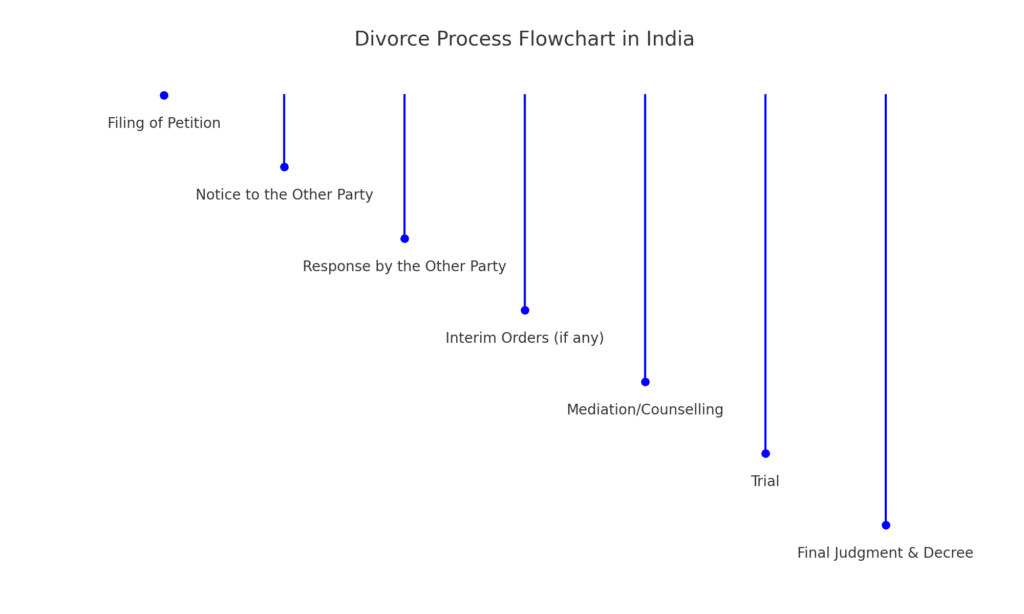Introduction to Matrimonial Law in India
Matrimonial law in India, encompassing the complexities of marriage, divorce, and family disputes, reflects the country’s diverse cultural and religious fabric. Governed by various statutes, these laws cater to different religious communities, each with its unique customs and traditions. This field of law not only deals with the legal aspects of marriage and its dissolution but also grapples with deeply personal and emotional issues, making it a sensitive and challenging area of legal practice.
Matrimonial Disputes means the disputes between husband and wife or in other words disputes between spouses. It may lead to Divorce, Nullity of Marriage, Maintenance of wife and child, Custody or guardianship of Child, Judicial Separation, Permanent alimony, Settlement and other outcomes.
Overview of Matrimonial Disputes in India
Matrimonial disputes in India refer to conflicts arising between married couples, including issues related to divorce, maintenance, custody of children, and property rights. The following are some of the key laws that govern matrimonial disputes in India:
- The Hindu Marriage Act, 1955: The Hindu Marriage Act, 1955 governs marriages between Hindus, Buddhists, Jains, and Sikhs. The act outlines the procedures for a valid marriage, the grounds for divorce, and the rights and obligations of married couples. The act also provides for maintenance, custody of children, and property rights.
- The Special Marriage Act, 1954: The Special Marriage Act, 1954 governs marriages between individuals who do not follow Hindu or personal law. The act provides for the procedures for a valid marriage, grounds for divorce, and rights and obligations of married couples.
- The Indian Divorce Act, 1869: The Indian Divorce Act, 1869 governs the divorce proceedings of Christians in India. The act provides for the grounds for divorce and the procedures for obtaining a divorce decree.
- The Protection of Women from Domestic Violence Act, 2005: The Protection of Women from Domestic Violence Act, 2005 provides for the protection of women from domestic violence. The act defines domestic violence and provides for the remedies available to women who are subjected to violence, including restraining orders, maintenance, and compensation.
- The Hindu Adoptions and Maintenance Act, 1956: The Hindu Adoptions and Maintenance Act, 1956 governs the adoption of children by Hindus and provides for the maintenance of wife, children, and other dependent relatives.
- The Guardians and Wards Act, 1890: The Guardians and Wards Act, 1890 governs the appointment of guardians for children and outlines the procedures for their appointment. The act also provides for the rights and obligations of guardians and the rights of children.
Meaning of Matrimonial
Matrimonial refers to matters related to marriage and married life, particularly in the context of family law. It typically includes matters such as divorce, separation, annulment, spousal support, child custody, property division, and other related issues. Matrimonial law in India is governed by the Hindu Marriage Act, 1955, the Indian Divorce Act, 1869, and the Special Marriage Act, 1954, among other laws. Matrimonial disputes are typically resolved in family courts, where a judge hears the case and makes a final decision based on the facts and applicable law.
In conclusion, matrimonial disputes can be complex and emotionally charged. It is advisable to seek the guidance of a qualified matrimonial lawyer to ensure that your rights and interests are protected. The laws outlined above provide a framework for resolving matrimonial disputes, but it is important to understand the specific provisions and procedures of each law to ensure that your case is handled properly.
Do remember that before the court of law, wife is entitled to equal life status that her husband enjoys or she would enjoy if she were at her matrimonial home. But for this it is important that wife must have valid reason for living separately from her husband. Now as per the latest judgement of Hon’ble Supreme Court, during the trial of matrimonial dispute both the parties are directed to file the Affidavit as per the annexure of the said judgement disclosing their Status/Income/Expenditure/Liabilities/Assets and etc.
In case of Hindu Marriage, if either of party has no independent income sufficient for her or his support and the necessary expenses of the proceeding then upon the application court may order respondent/non applicant to pay the petitioner, the expenses of the proceeding and maintenance.
The Hindu Marriage Act is applicable for cases where the husband and wife both are Hindus, Buddhists, Jains or Sikhs and if they were converted to any of those religions. Muslim Marriages are governed by Muslim Personal law. Family Court Act is equally applicable upon both the parties.
Case Studies in Matrimonial Law
Case studies offer insightful glimpses into the practical application of matrimonial laws. For example, the landmark case of Shayara Bano vs. Union of India led to the abolishment of instant triple talaq, significantly impacting Muslim matrimonial law. Another notable case is Prakash vs. Phulavati, which clarified women’s rights to ancestral property.
The Legal Process in Matrimonial Disputes
The legal process in matrimonial disputes typically involves filing a petition in a family court. The court may recommend counseling sessions in cases of divorce by mutual consent. In contested cases, issues like alimony, child custody, and property division are addressed, often requiring detailed legal proceedings.
Navigating Divorce Proceedings
Divorce proceedings in India vary based on the complexity of the case and the cooperation of the parties involved. Grounds for divorce include adultery, cruelty, and chronic disease. In mutual consent divorces, both parties agree on key issues, usually allowing for a smoother and quicker process.

The Role of a Matrimonial Lawyer
A matrimonial lawyer plays a critical role in guiding clients through the emotional and legal complexities of matrimonial disputes. They provide legal advice, represent clients in court, and help in negotiating settlements. A good lawyer also offers emotional support and understanding during these challenging times.
How to Find the Best Matrimonial Lawyer in India
When it comes to matrimonial disputes, having the right lawyer by your side can make a big difference. The following are some tips on how to find the best matrimonial lawyer in India:
- Look for experience: It is important to find a lawyer who has experience in handling matrimonial cases, as they will have a good understanding of the laws and procedures involved. Look for a lawyer who has a proven track record of successfully resolving matrimonial disputes.
- Seek referrals: Ask friends, family, and colleagues for referrals to matrimonial lawyers they have used in the past. Personal recommendations can be a valuable source of information.
- Consider their expertise: Different matrimonial cases require different skills and expertise. For example, if your case involves issues related to property or maintenance, look for a lawyer who has experience in these areas.
- Review their credentials: Check the lawyer’s credentials, including their education, professional experience, and membership in professional organizations.
- Communication skills: It is important to find a lawyer who you can communicate with effectively, as this will make the process of resolving your case smoother. Look for a lawyer who is responsive, approachable, and willing to explain the legal process in a way that you can understand.
- Consider their fee structure: Different lawyers have different fee structures. It is important to find a lawyer whose fees are reasonable and who will provide you with a clear explanation of the costs involved in resolving your case.
Conclusion: Navigating Matrimonial Legalities in India
Navigating matrimonial legalities in India requires an understanding of the diverse matrimonial laws and the judicial process. It’s crucial to seek the guidance of experienced matrimonial lawyers to ensure that one’s rights and interests are adequately represented and protected in these deeply personal and often complex legal matters.
In conclusion, finding the best matrimonial lawyer can be a challenging task, but it is important to take the time to find the right lawyer for your case. By considering the factors outlined above, you can increase your chances of finding a lawyer who will provide you with the best representation possible.
For want of more information and knowledge about the matrimonial cases and disputes, feel free to contact us.
FAQs on Matrimonial Law in India
- What is the difference between the Hindu Marriage Act and the Special Marriage Act? The Hindu Marriage Act applies to Hindus, Buddhists, Jains, and Sikhs, covering marriage, divorce, and other related matters. The Special Marriage Act allows for civil marriages regardless of the couple’s religion.
- How is alimony determined in a divorce case in India? Alimony is determined based on several factors, including the duration of the marriage, the couple’s lifestyle, the spouse’s income, and the custodial parent’s needs if children are involved.
- What are the legal rights of women in matrimonial disputes? Women have rights to maintenance, child custody, and a share of marital property. They are also protected against domestic abuse under specific laws.
- Can matrimonial disputes be resolved through mediation? Yes, mediation is encouraged as a way to amicably resolve disputes, focusing on mutual agreement rather than adversarial court proceedings.
- What are the grounds for seeking a divorce under the Hindu Marriage Act? Under the Hindu Marriage Act, grounds for divorce include adultery, cruelty, desertion for two years, conversion to another religion, unsound mind, leprosy, venereal disease, and a presumption of death if a spouse has not been heard from in seven years.
- Can a woman claim maintenance after divorce in India? Yes, a woman can claim maintenance after divorce under Section 125 of the Criminal Procedure Code and the Hindu Marriage Act. The amount depends on the husband’s income and the wife’s own income and lifestyle during the marriage.
- How is child custody determined in India? Child custody is determined based on the best interests of the child. Factors considered include the child’s age, the parent’s financial stability, mental and emotional health, and the child’s preference if they are old enough.
- What is the process for mutual consent divorce in India? Mutual consent divorce involves both spouses agreeing on major issues like alimony, child custody, and property division. The process requires filing a joint petition, followed by a six-month cooling-off period before the final hearing.
- Is it necessary to go to court for a divorce in India? Yes, obtaining a divorce in India requires legal proceedings in a family court, even in cases of mutual consent divorce.
- How long does a typical divorce process take in India? The duration varies based on the case’s complexity and the court’s backlog. Mutual consent divorces can take around six to eighteen months, while contested divorces can take several years.
- What is the role of mediation in matrimonial disputes in India? Mediation serves as an alternative dispute resolution method, where a neutral third party helps the couple reach a mutually agreeable solution. It is often faster and less adversarial than court proceedings.
- Can maintenance be claimed during the divorce process? Yes, interim maintenance can be claimed during the divorce process to provide financial support until the final settlement is reached.
- What are the legal rights of a wife in her husband’s property after divorce? A wife may have rights to her husband’s property acquired during the marriage, depending on the property’s nature and the couple’s marital regime.
- How are assets divided in a divorce case in India? Assets are divided based on factors like each spouse’s contribution to the household, income, and future financial prospects. The division aims to be equitable rather than equal.



